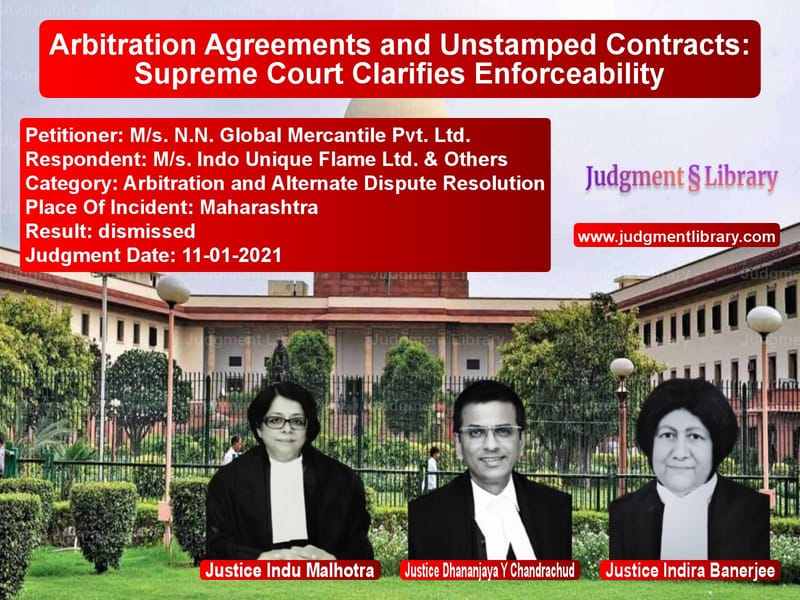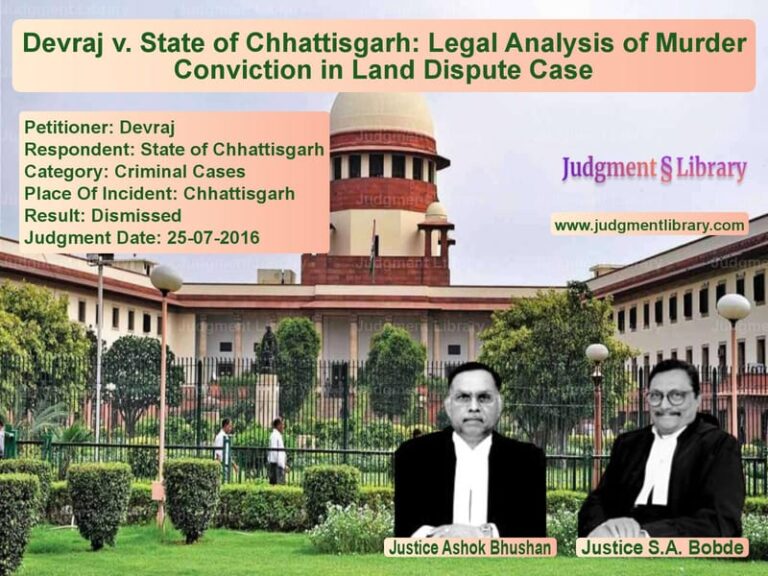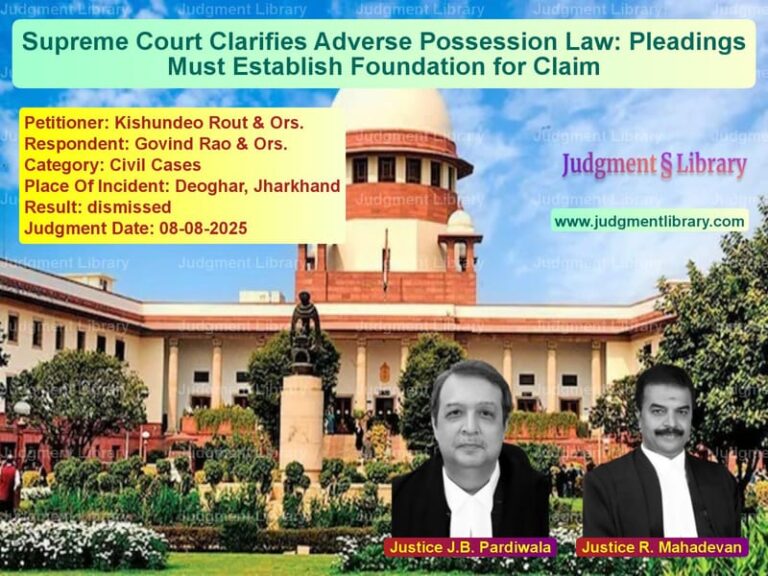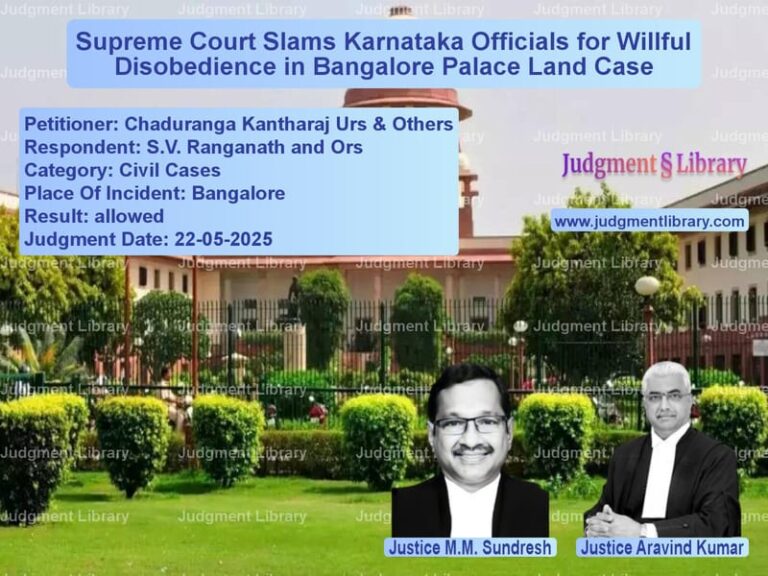Arbitration Agreements and Unstamped Contracts: Supreme Court Clarifies Enforceability
The Supreme Court of India in M/s. N.N. Global Mercantile Pvt. Ltd. vs. M/s. Indo Unique Flame Ltd. & Others delivered a landmark judgment addressing the enforceability of arbitration agreements embedded in unstamped contracts. The ruling clarified the doctrine of separability in arbitration agreements and held that such agreements remain valid and enforceable even if the underlying contract is unstamped.
Background of the Case
The case revolved around a work contract dated September 28, 2015, where Indo Unique Flame Ltd. (Respondent No. 1) entered into a subcontract with N.N. Global Mercantile Pvt. Ltd. (Appellant) for coal transportation. The contract contained an arbitration clause that mandated dispute resolution through arbitration.
Disputes arose when Indo Unique invoked a bank guarantee furnished by the appellant. N.N. Global Mercantile challenged the invocation, arguing that the work order had not been acted upon and that the invocation was fraudulent. A suit was filed before the Commercial Court in Nagpur, which issued an interim stay on the bank guarantee’s invocation.
Key Legal Issues Addressed
1. Whether an Arbitration Agreement in an Unstamped Contract is Valid?
The appellant contended that the arbitration clause in the work order was unenforceable since the document was not duly stamped under the Maharashtra Stamp Act, 1958. The argument relied on previous Supreme Court decisions in SMS Tea Estates Pvt. Ltd. vs. Chandmari Tea Co. Pvt. Ltd. and Garware Wall Ropes Ltd. vs. Coastal Marine Constructions, which held that an unstamped contract was unenforceable, rendering the arbitration clause inoperative.
2. Whether the Dispute Regarding Fraudulent Invocation of Bank Guarantee is Arbitrable?
The appellant argued that the bank guarantee was fraudulently invoked since the work order had not been acted upon. The respondent countered that disputes concerning bank guarantees should be referred to arbitration as per the work order.
3. Whether a Writ Petition is Maintainable for Challenging the Rejection of an Application for Arbitration?
The Bombay High Court had earlier ruled in favor of arbitration, setting aside the Commercial Court’s order that had restrained the invocation of the bank guarantee. The appellant filed a writ petition challenging the High Court’s decision.
Findings of the Court
1. Arbitration Agreement Remains Valid Despite Unstamped Contract
The Supreme Court overruled SMS Tea Estates and Garware Wall Ropes, holding that an arbitration agreement is a separate and independent contract from the main agreement. The Court observed:
“An arbitration agreement is distinct from the substantive contract in which it is contained. The invalidity of the main contract does not affect the validity of the arbitration agreement.”
The Court concluded that an arbitration agreement does not require stamp duty under the Maharashtra Stamp Act and can be enforced independently.
2. Allegations of Fraud are Arbitrable
The Court reaffirmed its stance in Avitel Post Studioz Ltd. vs. HSBC PI Holdings that allegations of fraud affecting only inter-party disputes do not preclude arbitration. It noted:
“The civil aspect of fraud, including allegations of fraudulent invocation of a bank guarantee, can be adjudicated by an arbitral tribunal.”
The Court ruled that only fraud affecting the validity of the arbitration clause itself or issues impacting public law may be deemed non-arbitrable.
3. Writ Petition Not Maintainable
The Supreme Court ruled that the appellant should have pursued an appeal under Section 37 of the Arbitration and Conciliation Act, 1996, rather than filing a writ petition under Articles 226 and 227 of the Constitution. The judgment held:
“A writ petition is not maintainable when an alternate statutory remedy is available.”
Supreme Court’s Verdict
- The arbitration agreement remains valid and enforceable despite the main contract being unstamped.
- Fraud allegations concerning the invocation of a bank guarantee are arbitrable.
- The Bombay High Court’s order allowing arbitration was upheld.
- The writ petition was dismissed, and the appellant was directed to approach the appropriate forum for relief.
Conclusion
This ruling has significant implications for arbitration law in India:
- Reinforces the doctrine of separability, ensuring that arbitration agreements are independent of the main contract.
- Limits judicial intervention at the pre-arbitration stage.
- Affirms that civil disputes concerning fraud are arbitrable unless they involve public law issues.
- Clarifies that unstamped contracts can still be subject to arbitration, provided stamp duty is paid before enforcement.
The Supreme Court’s decision strengthens India’s pro-arbitration stance and aligns its arbitration laws with international best practices.
Petitioner Name: M/s. N.N. Global Mercantile Pvt. Ltd..Respondent Name: M/s. Indo Unique Flame Ltd. & Others.Judgment By: Justice Indu Malhotra, Justice Dhananjaya Y Chandrachud, Justice Indira Banerjee.Place Of Incident: Maharashtra.Judgment Date: 11-01-2021.
Don’t miss out on the full details! Download the complete judgment in PDF format below and gain valuable insights instantly!
Download Judgment: ms.-n.n.-global-mer-vs-ms.-indo-unique-fla-supreme-court-of-india-judgment-dated-11-01-2021.pdf
Directly Download Judgment: Directly download this Judgment
See all petitions in Arbitration Act
See all petitions in Dispute Resolution Mechanisms
See all petitions in Institutional Arbitration
See all petitions in Judgment by Indu Malhotra
See all petitions in Judgment by Dhananjaya Y Chandrachud
See all petitions in Judgment by Indira Banerjee
See all petitions in dismissed
See all petitions in supreme court of India judgments January 2021
See all petitions in 2021 judgments
See all posts in Arbitration and Alternate Dispute Resolution Category
See all allowed petitions in Arbitration and Alternate Dispute Resolution Category
See all Dismissed petitions in Arbitration and Alternate Dispute Resolution Category
See all partially allowed petitions in Arbitration and Alternate Dispute Resolution Category







